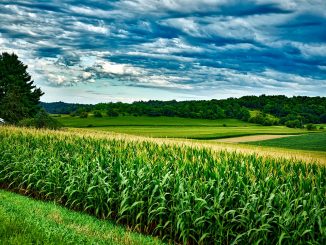
As part of Switzerland’s groundwork for its Clean Drinking Water Initiative, the Swiss federal government’s food and environmental agency Agroscope has completed a second, detailed study on the environmental impact the clean drinking water initiative can achieve. Peter Crosskey found that Agroscope’s preliminary findings suggest that while the country could indeed reduce pesticide levels in its drinking water, the gains would be eroded by the current carbon footprint of imported foods.
The Initiative for Clean Drinking Water (IEP) has strong support across the country. It sets a number of worthwhile objectives, including public funding for farms which do not use crop control products, with additional support for livestock holdings on farms which grow enough forage crops to manage without imported animal feedstuffs. There is also support for livestock holdings that do not use prophylactic antibiotics.
Agroscope researchers went into extensively detailed data modelling and refined a set of 18 environmental scenarios. Re-using a life cycle analysis framework from an earlier phase of the project, researchers are now in a position to fine tune their predictions and anticipate the levels to which certain measures should be taken.
In 2019, the team established that the drinking water initiative would need to trigger a transition to smaller herds and more extensive forage crops. The 2020 study looked at the environmental changes that smaller herds would bring about, coupled with a reduction in the number of livestock holdings across the country. As former livestock holdings are converted to other activities, Agroscope researchers investigated the probable impact on the agricultural landscape.
The key to unlocking Agroscope’s evaluations was the use of two tightly defined shopping baskets, one of home-produced consumer products, the other comprising imported equivalents. It was while re-using the life cycle analysis from the 2019 preliminary study that researchers realised that imports of meat, in particular, were even more damaging to the environment than the 2019 calculations had suggested.
According to the government statistics website per capita meat consumption in 2018 was 48 kilos, of which 43% was pigmeat. During the same year, Switzerland imported 76,500 tonnes of meat, some 18% of total meat consumption.
In addition to mainstream imports, a small country with easy access to cross-border shopping opportunities cannot make reliable estimates of the volumes or value of household cross-border shopping trips to fill freezers. Assuming no significant change in this marginal channel, the scope for legislative measures will be constrained by the continued availability of cheaper cross-border options.
Sticking to published figures, the Agroscope team underlined the disproportionate environmental impact of meat to food’s carbon footprint. “Improving the quality of water in Switzerland is [likely to be] equivalent to the cost of sometimes significantly higher environmental impacts in the countries of origin,” they concluded.
Full documentation is available in German with summaries in the other official Swiss languages and English, as a 10MB download from the Agroscope website. Additional files, including the comparative shopping baskets are also available. Download link here.
More on the Swiss Clean Drinking Water Initiative
Shifting Subsidies in Switzerland – the Clean Drinking Water Initiative.





